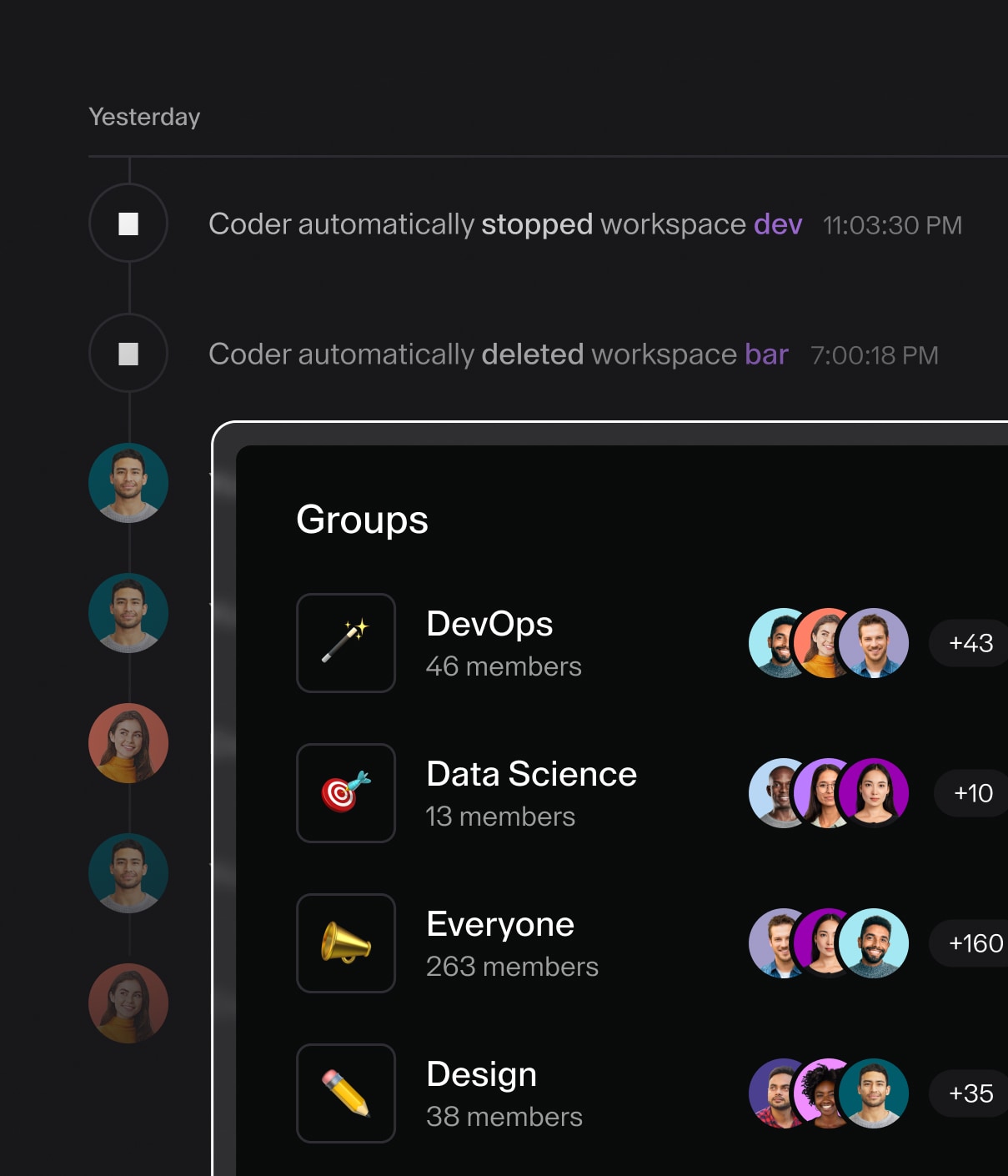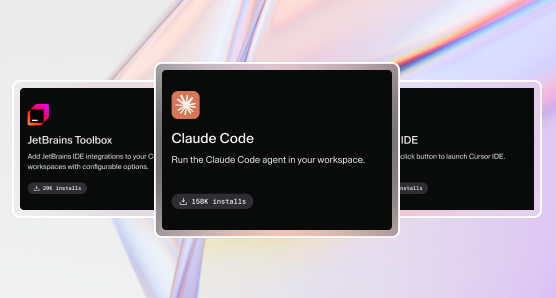Contributing
Requirements
The prerequisites for contributing to code-server are almost the same as those for VS Code. Here is what is needed:
nodev14.xgitv2.x or greatergit-lfsyarn- Used to install JS packages and run scripts
nfpm- Used to build
.deband.rpmpackages
- Used to build
jq- Used to build code-server releases
gnupg- All commits must be signed and verified; see GitHub's Managing commit signature verification or follow this tutorial
build-essential(Linux only - used by VS Code)- Get this by running
apt-get install -y build-essential
- Get this by running
rsyncandunzip- Used for code-server releases
bats- Used to run script unit tests
Creating pull requests
Please create a GitHub Issue that includes context for issues that you see. You can skip this if the proposed fix is minor.
In your pull requests (PR), link to the issue that the PR solves.
Please ensure that the base of your PR is the main branch.
Commits and commit history
We prefer a clean commit history. This means you should squash all fixups and fixup-type commits before asking for a review (e.g., clean up, squash, then force push). If you need help with this, feel free to leave a comment in your PR, and we'll guide you.
Development workflow
yarn
yarn watch
# Visit http://localhost:8080 once the build is completed.
yarn watch will live reload changes to the source.
Updates to VS Code
- Update the package tag listed in
vendor/package.json:
{
"devDependencies": {
"vscode": "cdr/vscode#X.XX.X-code-server"
}
}
- From the code-server project root, run
yarn install. Then, test code-server locally to make sure everything works. - Check the Node.js version that's used by Electron (which is shipped with VS Code. If necessary, update your version of Node.js to match.
- Open a PR
Watch for updates to
vendor/modules/code-oss-dev/src/vs/code/browser/workbench/workbench.html. You may need to make changes tosrc/browser/pages/vscode.html.
Build
You can build as follows:
yarn build
yarn build:vscode
yarn release
Run your build:
cd release
yarn --production
# Runs the built JavaScript with Node.
node .
Build the release packages (make sure that you run yarn release first):
yarn release:standalone
yarn test:standalone-release
yarn package
On Linux, the currently running distro will become the minimum supported version. In our GitHub Actions CI, we use CentOS 7 for maximum compatibility. If you need your builds to support older distros, run the build commands inside a Docker container with all the build requirements installed.
Test
There are three kinds of tests in code-server:
- Unit tests
- Integration tests
- End-to-end tests
Unit tests
Our unit tests are written in TypeScript and run using Jest, the testing framework].
These live under test/unit.
We use unit tests for functions and things that can be tested in isolation. The file structure is modeled closely after /src so it's easy for people to know where test files should live.
Integration tests
These are a work in progress. We build code-server and run a script called test-standalone-release.sh, which ensures that code-server's CLI is working.
Our integration tests look at components that rely on one another. For example, testing the CLI requires us to build and package code-server.
End-to-end tests
The end-to-end (e2e) tests are written in TypeScript and run using Playwright.
These live under test/e2e.
Before the e2e tests run, we run globalSetup, which eliminates the need to log
in before each test by preserving the authentication state.
Take a look at codeServer.test.ts to see how you would use it (see
test.use).
We also have a model where you can create helpers to use within tests. See models/CodeServer.ts for an example.
Generally speaking, e2e means testing code-server while running in the browser
and interacting with it in a way that's similar to how a user would interact
with it. When running these tests with yarn test:e2e, you must have
code-server running locally. In CI, this is taken care of for you.
Structure
The code-server script serves as an HTTP API for login and starting a remote VS
Code process.
The CLI code is in src/node and the HTTP routes are implemented in src/node/routes.
Most of the meaty parts are in the VS Code portion of the codebase under vendor/modules/code-oss-dev, which we describe next.
Modifications to VS Code
In v1 of code-server, we had a patch of VS Code that split the codebase into a front-end and a server. The front-end consisted of the UI code, while the server ran the extensions and exposed an API to the front-end for file access and all UI needs.
Over time, Microsoft added support to VS Code to run it on the web. They have made the front-end open source, but not the server. As such, code-server v2 (and later) uses the VS Code front-end and implements the server. We do this by using a Git subtree to fork and modify VS Code. This code lives under vendor/modules/code-oss-dev.
Some noteworthy changes in our version of VS Code include:
- Adding our build file,
vendor/modules/code-oss-dev/coder.js, which includes build steps specific to code-server - Node.js version detection changes in
build/lib/node.tsandbuild/lib/util.ts - Allowing extra extension directories
- Added extra arguments to
src/vs/platform/environment/common/argv.tsand tosrc/vs/platform/environment/node/argv.ts - Added extra environment state to
src/vs/platform/environment/common/environment.ts; - Added extra getters to
src/vs/platform/environment/common/environmentService.ts - Added extra scanning paths to
src/vs/platform/extensionManagement/node/extensionsScanner.ts
- Added extra arguments to
- Additions/removals from
package.json:- Removing
electron,keytarandnative-keymapto avoid pulling in desktop dependencies during build on Linux - Removing
gulp-azure-storageandgulp-tar(unsued in our build process, may pull in outdated dependencies) - Adding
proxy-agent,proxy-from-env(for proxying) andrimraf(used during build/install steps)
- Removing
- Adding our branding/custom URLs/version:
- Removing azure/macOS signing related dependencies from
build/package.json - Modifying
.gitignoreto allow us to add files tosrc/vs/serverand modifying.eslintignoreto ignore lint on the shared files below (we use different formatter settings than VS Code). - Sharing some files with our codebase via symlinks:
- Allowing socket changes by adding
setSocketinsrc/vs/base/parts/ipc/common/ipc.net.ts- We use this for connection persistence in our server-side code.
- Added our server-side Node.JS code to
src/vs/server.- This code includes the logic to spawn the various services (extension host, terminal, etc.) and some glue
- Added
src/vs/workbench/browser/client.tsto hold some server customizations.- Includes the functionality for the Log Out command and menu item
- Also, imported and called
initializefrom the main web file,src/vs/workbench/browser/web.main.ts
- Added a (hopefully temporary) hotfix to
src/vs/workbench/common/resources.tsto get context menu actions working for the Git integration. - Added connection type to WebSocket query parameters in
src/vs/platform/remote/common/remoteAgentConnection.ts - Added
CODE_SERVER*variables to the sanitization list insrc/vs/base/common/processes.ts - Fix localization support:
- Added file
src/vs/workbench/services/localizations/browser/localizationsService.ts. - Modified file
src/vs/base/common/platform.ts - Modified file
src/vs/base/node/languagePacks.js
- Added file
- Added code to allow server to inject settings to
src/vs/platform/product/common/product.ts - Extension fixes:
- Avoid disabling extensions by extensionKind in
src/vs/workbench/services/extensionManagement/browser/extensionEnablementService.ts(Needed for vscode-icons) - Remove broken symlinks in
extensions/postinstall.js - Add tip about extension gallery in
src/vs/workbench/contrib/extensions/browser/extensionsViewlet.ts - Use our own server for GitHub authentication in
extensions/github-authentication/src/githubServer.ts - Settings persistence on the server in
src/vs/workbench/services/environment/browser/environmentService.ts - Add extension install fallback in
src/vs/workbench/services/extensionManagement/common/extensionManagementService.ts - Add proxy-agent monkeypatch and keep extension host indefinitely running in
src/vs/workbench/services/extensions/node/extensionHostProcessSetup.ts - Patch build system to avoid removing extension dependencies for
yarn global addusers inbuild/lib/extensions.ts - Allow all extensions to use proposed APIs in
src/vs/workbench/services/environment/browser/environmentService.ts - Make storage writes async to allow extensions to wait for them to complete in
src/vs/platform/storage/common/storage.ts
- Avoid disabling extensions by extensionKind in
- Specify webview path in
src/vs/code/browser/workbench/workbench.ts - URL readability improvements for folder/workspace in
src/vs/code/browser/workbench/workbench.ts - Socket/Authority-related fixes (for remote proxying etc.):
- Added code to write out IPC path in
src/vs/workbench/api/node/extHostCLIServer.ts
As the web portion of VS Code matures, we'll be able to shrink and possibly eliminate our modifications. In the meantime, upgrading the VS Code version requires us to ensure that our changes are still applied and work as intended. In the future, we'd like to run VS Code unit tests against our builds to ensure that features work as expected.
We have extension docs on the CI and build system.
If the functionality you're working on does NOT depend on code from VS Code, please move it out and into code-server.
Currently Known Issues
- Creating custom VS Code extensions and debugging them doesn't work
- Extension profiling and tips are currently disabled


